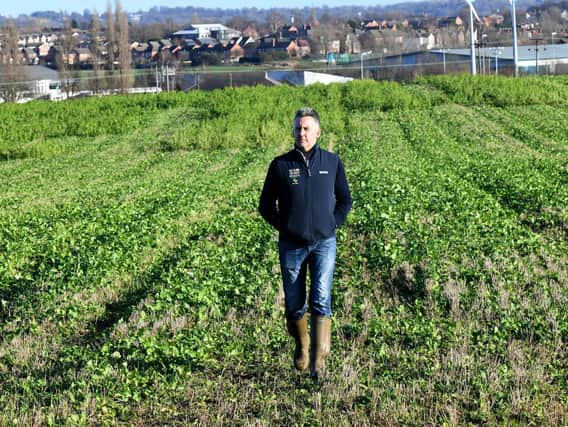Farm of the Week: From promising cricketer to running the family farms and livery yard in Doncaster


A fifth generation farmer, Mark worked alongside his father John for many years before taking over the reins. He now operates Whincover Farm in Manvers, Wath upon Dearne and Chestnut Farm in Sprotbrough, South Yorkshire, eight miles away from the family home.
In his teens he had cricket trials for the county, around the time Michael Vaughan and Ryan Sidebottom were playing, but he said it was “not to be”.
Advertisement
Hide AdAdvertisement
Hide AdBut while he turned his main focus to farming he still kept his cricketing hand in playing with Sheffield United in the Yorkshire League and Wickersley in the South Yorkshire Premier.
The farming business now combines a number of strands including cereals crops, hay and haylage, livery stables, sports pitch restoration, arena and paddock construction and event hire of small bales.
“My great-grandfather Edwin Edgar Downing was a wheeler-dealer when it came to buying and selling cattle, hay and straw,” said Mark.
“He was the driving force who found the money to buy Whincover Farm. We had a small suckler herd of cattle up to five years ago, but you have to be around pretty much 24/7 for livestock and that didn’t interest me."
Advertisement
Hide AdAdvertisement
Hide AdMark’s parents, John and Anne, still live on the farm while he and wife Nicki live nearby with their daughters five-year-old Annabel and two-year-old Lottie.
Mark said part of his approach towards farming was influenced by his studies at agricultural college where he completed his national certificate in farm management.
“I’d always worked with dad and my summers used to revolve around stacking small hay and straw bales. Going to Bishop Burton gave me a brilliant grounding.”
He said he came back from college with a new perspective not just from his studies but also visiting his friends' farms and seeing how they worked.
Advertisement
Hide AdAdvertisement
Hide Ad“I knew I wanted our farm to be as smart and well presented as others were. We were storing a lot of junk at the time and it was looking at this that brought about the opportunities we have explored since.”
Mark’s first new enterprise on the farm around 20 years ago was setting up the livery stables, a move inspired by one of his college friends who had successfully converted his dairy farm.
The two Shire horse stables were converted and Mark said it grew from there. “This is an ideal area for those with horses and step by step we have increased the number of stables utilising old and redundant farm buildings.
“We now have excellent facilities that are endorsed by the British Horse Society, which is no mean feat as you have to meet extremely high standards. During the past year the organisation has been an absolutely brilliant support for us.”
Advertisement
Hide AdAdvertisement
Hide AdMark’s two farms make up 300 acres, with 160 at Whincover and 140 at Chestnut. His largest single acreage of any crop is 100 acres of grass for hay and haylage, with around 80 acres of spring barley and 50 acres of winter wheat.
The rest is largely rented to other growers for sugar beet and potato production. He also has land in environmental stewardship.
“Our haylage is all produced from one-year grass leys in order to come up with the best quality we can for our equine customers,” said Mark.
“We use around 50 per cent of our hay and haylage through the livery and the other half is delivered through our company name South Yorkshire Haylage.
Advertisement
Hide AdAdvertisement
Hide Ad“Grass is generally on a four to five-year rotation and we put in 20 acres of new grass each year for haylage. We follow grass by ploughing out and putting in spring barley and then stubble turnips and mustard seed for cover.”
Mark said the land type differs from Whincover Farm to Chestnut Farm.
“Our home farm at Whincover is easy working, sandy loam and at Sprotbrough it is on a limestone ridge.
“We are growing the milling wheat variety Skyfall again this year. We have grown it for the last three years and it normally averages around four tonnes per year.”
Advertisement
Hide AdAdvertisement
Hide AdMark has added a number of environmental measures as part of his stewardship including wild birdseed plots, pollen and nectar mixes, an otter halt, scrapes and hedgerows - initiatives which also saw him nominated as arable innovator of the year in the British Farming Awards last year.
“The increase in wildlife has also benefitted the shoot that we run across both farms,” he said.
Mark said he has also been able to benefit from grants offered by both Business Link and the Yorkshire Agricultural Society’s Growing Routes programme.
Having different strands to the business has also led to business opportunities Mark said they would not have considered previously.
Advertisement
Hide AdAdvertisement
Hide Ad“A few years ago we had an enquiry through our South Yorkshire Haylage website to supply small bales for an event at Wentworth Woodhouse.”
From that grew an event hire business which supplies small bales for weddings, events and even TV and film sets.
“We now run an event hire business called Event Bales which also includes picnic benches and trestle tables,” Mark said.
Adding another string to his bow and again from his association with horses, Mark has also started working with a local family-run company called Botham Prestige, having first come into contact with them when they started cutting the grass around the stables.
“I’ve started working with Mick and Joshua Botham on sports pitch restoration, pasture and amenity turf supply,” he said.
Comment Guidelines
National World encourages reader discussion on our stories. User feedback, insights and back-and-forth exchanges add a rich layer of context to reporting. Please review our Community Guidelines before commenting.